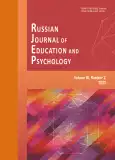Ontology of the problem of professional competence of future foreign language teachers in India
- Autores: Belovetskaia L.E.1
-
Afiliações:
- Severodonetsk Technological Institute (branch) of Vladimir Dahl Lugansk State University
- Edição: Volume 16, Nº 2 (2025)
- Páginas: 142-162
- Seção: Educational and Pedagogical Studies
- ##submission.datePublished##: 30.04.2025
- URL: https://journal-vniispk.ru/2658-4034/article/view/302850
- DOI: https://doi.org/10.12731/2658-4034-2025-16-2-811
- EDN: https://elibrary.ru/YCRACZ
- ID: 302850
Citar
Texto integral
Resumo
Background. The problem of the professional competence of future teachers of foreign languages in India is complex and multi-faceted. It concerns not only the issues of linguistic training, but also the social, cultural and economic aspects of the country’s educational system.
In the ontological sense, this problem is associated with the concept of professional competence, which implies not just the possession of language, but also a set of knowledge, skills and qualities necessary for the successful performance of pedagogical activities. In the context of India, where multilingualism is the norm and English plays a special role in education and social mobility, the question of competence becomes even more relevant.
The national education policy of India is increasingly focusing on the training of foreign language teachers. However, there are certain challenges that need to be overcome: a sharp lack of teachers in the field of the teaching methodology of foreign languages, the lack of unified criteria and procedures for the assessment of professional competence.
Purpose is to define and study the essence and factors of the indicated problem in the Indian and domestic scientific and educational discussion.
Materials and methods. In this study, a set of theoretical methods were applied: analysis, synthesis, abstraction, aggregation, integration and classification. The use of comparative analysis allowed to identify the key characteristics of the object of the study. The research is based on scientific publications on this topic, as well as the regulatory and legal basis.
Results. The formation of the modern profile of competence of foreign language teachers in India is largely due to the National Education Policy (NEP), approved in 2020. The requirements for the qualification of teachers vary depending on the level of education. At the initial and preparatory stages of learning, the emphasis is made on the development of the oral communication of students in a foreign language. At the end of the secondary education, the formation of reading and writing skills is expected. In the high school, the teacher must ensure that students reach a level of effective communication, including reasoning and argumentation, in both oral and written form.
Despite this, the education system of India faces a number of challenges: class overload, staff deficit, excess administrative burden, priority of written communication, lack of unified policy regarding foreign languages by the educational councils of different states, insufficient attention to the linguistic and cultural aspect in the training of teachers in a number of universities.
Sobre autores
Lina Belovetskaia
Severodonetsk Technological Institute (branch) of Vladimir Dahl Lugansk State University
Autor responsável pela correspondência
Email: linabelovetskaia@yandex.ru
ORCID ID: 0000-0003-3360-687X
PhD in Pedagogy, Associate Professor, Head of the Department of Social Sciences and Humanities
Rússia, 59a, Sovetsky Ave., Severodonetsk, Lugansk People's Republic, 293401, Russian FederationBibliografia
- Gubina, M. A. (2023). Reform of school education in India 2020: economic prerequisites and objectives. RUDN Journal of Economics, 31(4), 760–778. https://doi.org/10.22363/2313-2329-2023-31-4-760-778 EDN: https://elibrary.ru/SGZQRQ
- Demchenko, M. B. (2021). Anthropological approach to teaching foreign languages. Vestnik of Moscow State Linguistic University. Education and Pedagogical Sciences, (2), 81–91. https://doi.org/10.52070/2500-3488_2021_2_839_81 EDN: https://elibrary.ru/SNFYOJ
- Dmitrieva, N. K. (2023). Improving the professional competence of a foreign language teacher in the context of modified "immersive learning". Problems of Modern Pedagogical Education, (80-1), 119–121.
- Erokhin, A. K. (2007). Tolerance as an ideal of education in the philosophy of Rabindranath Tagore. Oikoumena. Regional Studies, (2), 16–25.
- Ismailova, N. O. Q. (2023). Application of the Indian experience of teaching English in the educational process of Uzbekistan. Science and Education Today, (1), 28–34.
- Pantykina, N. I. (2018). Innovative practices of teaching foreign languages based on the experience of foreign researchers. Vestnik of Cherepovets State University, (1), 145–148. https://doi.org/10.23859/1994-0637-2018-1-82-20 EDN: https://elibrary.ru/YPMALE
- Ryaguzova, E. V., & Chernyaeva, T. I. (2023). Meaningful codes of the modern profession "teacher": invariants and innovations. Izvestiya of Saratov University. New Series. Series: Philosophy. Psychology. Pedagogy, (2), 203–210. https://doi.org/10.18500/1819-7671-2023-23-2-203-210 EDN: https://elibrary.ru/LIDFXI
- Tozhibaeva, K. S. K. (2018). Professional pedagogical competence of a teacher: the phenomenology of the concept. Questions of Science and Education, (27), 95–97.
- Anderson, J. (2022). Learning from Indian teacher expertise: A policy and practice report for educational organisations in India. Economic and Social Research Council. 18 p. https://doi.org/10.13140/RG.2.2.21551.61609
- Balwaria, R., & Gawarikar, V. (2023). Teacher Education in India: Teaching competencies for developing 21st-century skills. Chapter-13. P. 147–158. Retrieved from https://www.researchgate.net/publication/373872910_Teacher_Education_in_India_Chapter-13_Teaching_competencies_for_Developing_21_st_Century_skills (accessed: January 7, 2024).
- Brahme, M. (2020). Foreign Language Studies in India: Some Critical Observations. Language and Language Teaching, 68–74. https://doi.org/10.4018/979-8-3693-5738-5.ch013
- Evangeline, B., & Konobiev, A. (2022). Professional Competencies of Teachers of Foreign Languages. Professional Discourse & Communication, 4(4), 42–52. https://doi.org/10.24833/2687-0126-2022-4-4-42-52 EDN: https://elibrary.ru/JUQNSF
- Kapur, R. (2018). Issues and Problems of Teacher Education. Retrieved from https://www.researchgate.net/publication/329745226_Issues_and_Problems_of_Teacher_Education (accessed: October 18, 2021).
- Mandavkar, P. (2023). Role of Languages in National Education System of India. SSRN Electronic Journal, 6 p. https://doi.org/10.2139/ssrn.4609001
- Mondal, A., & Baidya, M. N. (2024). Future Teacher Education in India. The Social Sciences Review, 2(2), 38–44. Retrieved from https://tssreview.in/wp-content/uploads/2024/03/4-3.pdf (accessed: January 28, 2025).
- National Education Policy (2020). Ministry of Human Resource Development Government of India. Retrieved from https://www.education.gov.in/sites/upload_files/mhrd/files/NEP_Final_English_0.pdf (accessed: January 9, 2025).
- Rani, A. (2017). Problems and Solution of Teacher Education. International Journal of Academic Research in Education and Review, 5(1), 15–19. https://doi.org/10.14662/IJARER2017.002
- Singh, A., & H. B. A. Halim. (2023). Addressing Challenges in Language Teaching in India: Exploring the Role of Corrective Feedback in Enhancing Learning. Advanced Education, 10(22), 152–184. https://doi.org/10.20535/2410-8286.278042 EDN: https://elibrary.ru/ZQZZEH
Arquivos suplementares










